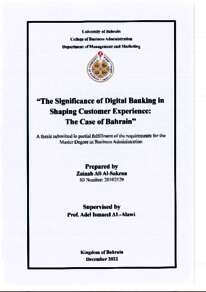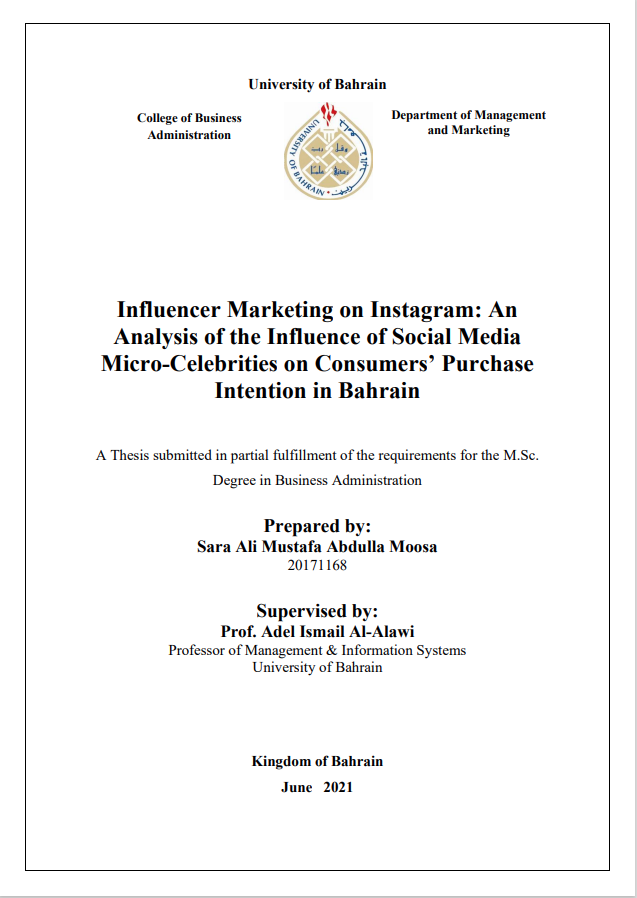Effects of the use of social media on brand equity : An empirical study of Bahrain as a tourist destination.
Linked Agent
Tomazos, Konstantinos , Thesis advisor
Date Issued
2023
Language
English
Extent
[1], 125 pages
Subject
Place of institution
United Kingdom
Thesis Type
Thesis (Master)-University of Strathclyde Business School, United Kingdom, 2023
Institution
University of Strathclyde
Description
Abstract Background: The aim of this research is to set the stage with an extensive literature review to position the concept of BE and its various dimensions with a focus on peer-reviewed publications covering the influence of social media platforms, BE creation, and consumer behaviour with a secondary emphasis on participants’ willingness to recommend nation brands in e-Word of Mouth communications.
Methodology: The study uses quantitative analysis through 53 questions over eight questionnaire sections. The development of the questionnaire started with the Literature Review. Once the model was identified, measures for the variables were adapted from international research where they were repeatedly found, used, and found to be reliable. The questions use seven Likert scales ranging from (1) strongly disagree to (7) strongly agree. The data was collected This study used purposeful sampling, also known as convenience sampling. Data collection began on 3rd March 2022, and was completed on 5th July of 2022. The collected sample of 243 was compiled and processed using Qualtrics Survey.
Main Findings: 11 hypotheses were derived and tested. Hypotheses one, two, three, and eight were found to have sufficient statistical support in this study, whereas hypotheses five, seven, nine, and eleven did not report any statistically significant evidence. The intensity of social media was found to have positive influence on brand equity (H1). Brand equity on social media platforms was found to have a positive influence on users’ intention to develop WoM communications (H2). Brand equity has a positive influence on the intention to develop e-WoM communications (H3). Perceived quality on social media had a positive influence on the intention to develop WoM communications (H8).
Implications: Theoretically, the findings offer a sturdy starting point in the quest to develop a theory that explains the dynamics or nature of BE-based interactions between social media users and - their – WoM communications. Practical implications include revising existing policies, planning, programmes, and previously developed campaigns in light of these findings. Another practical implication may see the development of new policies, plans, programmes or campaigns that address this research's findings to further strengthen Bahrain as an increasingly popular - and positively considered - destination among travel segments worldwide.
Main Recommendations: Policy makers should be informed by the univariate, bivariate, and multivariate results of this study and should consider the findings of bivariate analysis to establish new approaches to campaigns and programmes, if not to modify existing content/strategies. Moreover, policy makers should be guided by the structural relations that were found to be statistically significant and aim to maintain these high value relations. On the other hand, policy makers should intervene where the structural relations that were hypothesised are not found to be
3
statistically significant - and thus ensure this has a strong chance at positive growth in the future. Future research should consider testing moderator variables, such as respondents’ profile, nationality, and the economy scale of each country.
Keywords: Use of Social Media, Brand Equity, WoM and e-WoM
Methodology: The study uses quantitative analysis through 53 questions over eight questionnaire sections. The development of the questionnaire started with the Literature Review. Once the model was identified, measures for the variables were adapted from international research where they were repeatedly found, used, and found to be reliable. The questions use seven Likert scales ranging from (1) strongly disagree to (7) strongly agree. The data was collected This study used purposeful sampling, also known as convenience sampling. Data collection began on 3rd March 2022, and was completed on 5th July of 2022. The collected sample of 243 was compiled and processed using Qualtrics Survey.
Main Findings: 11 hypotheses were derived and tested. Hypotheses one, two, three, and eight were found to have sufficient statistical support in this study, whereas hypotheses five, seven, nine, and eleven did not report any statistically significant evidence. The intensity of social media was found to have positive influence on brand equity (H1). Brand equity on social media platforms was found to have a positive influence on users’ intention to develop WoM communications (H2). Brand equity has a positive influence on the intention to develop e-WoM communications (H3). Perceived quality on social media had a positive influence on the intention to develop WoM communications (H8).
Implications: Theoretically, the findings offer a sturdy starting point in the quest to develop a theory that explains the dynamics or nature of BE-based interactions between social media users and - their – WoM communications. Practical implications include revising existing policies, planning, programmes, and previously developed campaigns in light of these findings. Another practical implication may see the development of new policies, plans, programmes or campaigns that address this research's findings to further strengthen Bahrain as an increasingly popular - and positively considered - destination among travel segments worldwide.
Main Recommendations: Policy makers should be informed by the univariate, bivariate, and multivariate results of this study and should consider the findings of bivariate analysis to establish new approaches to campaigns and programmes, if not to modify existing content/strategies. Moreover, policy makers should be guided by the structural relations that were found to be statistically significant and aim to maintain these high value relations. On the other hand, policy makers should intervene where the structural relations that were hypothesised are not found to be
3
statistically significant - and thus ensure this has a strong chance at positive growth in the future. Future research should consider testing moderator variables, such as respondents’ profile, nationality, and the economy scale of each country.
Keywords: Use of Social Media, Brand Equity, WoM and e-WoM
Member of
Identifier
https://digitalrepository.uob.edu.bh/id/6f86064c-ec7e-4656-a47d-4f9d740d0259
Same Subject

